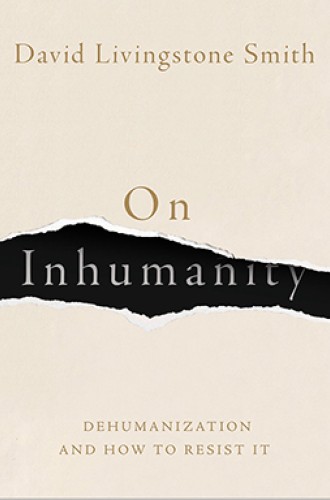What’s behind dehumanization?
A book about the psychology and politics of doing terrible things to one another
Philosophers believe in the power of thinking—not positive thinking in the Norman Vincent Peale and Joel Osteen sense, but precise thinking. They may place too much hope in the power of conceptual precision to make a difference in the real world. Perhaps it is their occupational hazard. But it is also one of their primary contributions to the human family. On Inhumanity helps make the case that philosophy is indispensable to making a better world, which requires first understanding what has gone wrong with the world we have made.
On Inhumanity is an update and popularization of David Livingstone Smith’s 2011 book Less Than Human: Why We Demean, Enslave and Exterminate Others. Smith wants to reach a broad, nonacademic audience with concepts that he considers utterly critical to human well-being. In 26 short, crisp, deeply disturbing chapters, he offers an accessible path into understanding the psychology and politics of the phenomenon of dehumanization.
Read our latest issue or browse back issues.
Smith begins by showing why dehumanization matters: it “fuels the worst brutalities that human beings perpetrate against one another.” In particular, it enables people to murder others at mass scale. He believes that dehumanization is not the cause of our “desire to harm others” but rather a tool we use to fulfill this desire. We develop processes of dehumanization to overcome built-in inhibitions against shedding human blood as we build up to genocide. “Dehumanization isn’t always in the service of slaughter,” Smith adds. “It’s also the handmaid of oppression. We find its bloodstained fingerprints all over chattel slavery.”
So what is it, exactly? Dehumanization, as Smith defines it, is the development of the view that someone may look human but is really essentially less than human. In this sense it differs “from racism, misogyny, xenophobia, or other forms of prejudice and oppression. To dehumanize others is to think of them not merely as inferior human beings, but as subhuman creatures.”
Deploying numerous examples from various settings and eras, Smith documents how often propagandistic language referring to the enemy as less than human precedes and accompanies mass atrocity against targeted groups. He quotes a 1942 Nazi SS booklet called The Subhuman that contains this line in reference to Jewish people: “Not all of those who appear human are in fact so. Woe to him that forgets it!”
Smith probes further, going deep into the moral abyss. Do people really believe their own rhetoric when they describe another group of human beings as “a race of subhumans disguised as a human race”? His answer is yes: “Dehumanizers aren’t just pretending. They sincerely believe that those whom they persecute are less than human.”
But how is it that people can convince themselves that some group of their neighbors is not actually human? Smith argues that dehumanization is first a political process. It helps to remember that “the category of the human is a social construction” and that there is a long history of societies defining some in and some out of this crucial category. Dominant groups tend to define themselves as the paradigm of humanity or even as the only full humans. The question of who counts as human is really a question of who has power.
The political process of dehumanization also requires certain psychological dynamics. For example, there is the long-standing human tendency to create categories of race and then essentialize the characteristics of groups of people according to these categories. Smith delves into the psychology of this process to make the case that social constructions of race are intrinsically racist and thus should be abandoned. “The idea of race has notions of inferiority baked into it, and the crushing weight of centuries behind it. It’s in the cultural air that we breathe and can’t be switched off by dint of good intentions.” Further, racist attitudes “readily morph into dehumanizing ones.”
Then there is the human habit of classifying everything according to hierarchies, exemplified by the historic great chain of being, which moves from God down to the lowest forms of animal and plant life. With this chain of being in mind, all you have to do to dehumanize is to classify certain humans into a particular group and then move that group down the hierarchy into a subhuman animal category, as has so often been done.
Crucially, as Smith points out, human morality includes millennia of debate as to “what kinds of beings are killable.” Since humans have been hunting and killing animals for at least three million years, the demotion of a group of people from human to animal is a signal that the killing can begin at any time.
Smith makes many clarifications and distinctions. He writes, for example, about different sublanguages of dehumanization. There is dehumanization through language of filth or impurity, evoking “cleansing” campaigns of murder. There’s dehumanization through turning the other into a superhuman race of demons, monsters, or criminals, making the enemy a metaphysical threat and evoking murder as a cosmic battle against evil. There’s also “enfeebling dehumanization,” in which the other is still viewed as metaphysically threatening but also as physically weak or innocuous. When this is the case, the dehumanized groups are spoken of and treated more like livestock, pets, or prey.
On Inhumanity is filled with awful examples of dehumanization and its consequences from many periods and places. Smith is intentional about not only drawing from the usual (distant, enemy) suspects: he also includes lynching in the American South, British atrocities in Kenya, American crimes in Vietnam, and the egregious dehumanization of indigenous Americans.
Along the way he offers clear and precise definitions of race, racism, essentialism, hate, illusion, ideology, white supremacy, dangerous speech, propaganda, humiliation, exterminationism, cruelty, sexism, ableism, and transphobia. (These last three are handled very briefly and with less success than others.) One does not have to agree with all his categories and definitions to appreciate the effort.
In the end, Smith wants his readers to resist dehumanization in every way that we can. This includes politics, but it also requires honesty about the dark recesses of human psychology. Any of us can become susceptible to viewing and treating others in a dehumanizing way. We dare not dehumanize the dehumanizers, to distance ourselves from a human problem that belongs to all of us.







